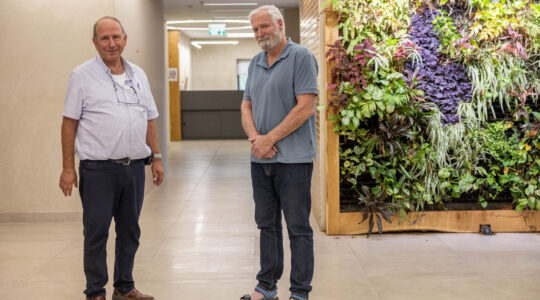You think Israel’s economy is on the rise? That the Israeli third sector is growing fast enough to make American philanthropic dollars less necessary? That Israel is on the cusp of being an international financial power?
Think again, Benny Landa told the Fundermentalist.
Landa sold his Israeli-based company Indigo which revolutionized digital color printing to Hewlett Packard in 2002 when it was worth about $1 billion. He has since committed $50 million to social welfare projects in Israel and recently published a manifesto about the Israeli economy.
And while much has been said recently about the rise of Israel’s ultra-wealthy class, its fast-growing economy and its burgeoning philanthropic sector, Landa did not paint a rosy picture in the wide-ranging telephone interview Tuesday from Israel.
“The Israeli economy, despite all of the hoopla and excitement over foreign investment and the rising shekel, is a bubble that is going to pop,” he said.
The gap between the wealthy and the poor is rapidly growing, and the majority of the poor are Israeli Arabs and Charedi Jews two sectors that can cause considerable unrest. For all of the talk about Israel’s economic growth, a look at the Gini Index, which measures the wealth gap, shows that Israel is far behind most of the developed world. The perfect distribution of wealth, according to the index, is zero. Israel’s is 39, more than twice that of progressive European countries, Landa said.
“We have two societies. One country is like Denmark where people are prosperous and high tech; the other one is like El Salvador, where you have a $2,500 GDP per capita, huge families, terrible poverty and hopelessness,” he said. “Fixing that is priority number one. It is not a society that can survive.”
The biggest problem, according to Landa, is that, even though Israeli companies are selling for big money to foreign investors such as Warren Buffet, and even though foreign investors are pumping money into Israel financial indexes, Israel’s wealth is all liquid, and that investment is bringing in little manufacturing to Israel, which means very few jobs are being created.
Only 37 percent of Israelis actually work, he said, compared to the United States, where 50 percent of the population works. (He warned against looking at the unemployment rate, which only measures the percentage of those who have actually worked before who have jobs.)
It is the role of the wealthy class to help ease that gap between rich and poor, said Landa, who loathes the term philanthropist.
“I am a high tech industrialist. I am an industrialist. I don’t donate. I invest,” he said. “I look at something in terms of social investing, as something that I want pay back on. I want the most bang for the buck.”
On the business side, Landa made sure that when he sold out to HP that the computer giant kept jobs in Israel. Some 2,000 Israeli manufacturing jobs were created directly by the sale, and another 9,000 indirectly, he said.
On the social investment side, Landa is in the midst of a $50 million investment in helping Israel’s poor rise up.
During its first phase, he put some $25 million towards the Jewish Agency for Israel’s Atidim project, which takes precocious Israeli youths from the country’s poorest areas and gives them intensive math and science training and scholarships to Israel’s top schools so that they can take high-level jobs in the army before moving into the high-tech professional world.
In its second phase, he is now invested in other projects that do the same for Israelis that cannot serve in the army, primarily Israeli-Arabs and Charedi Jews which he likens to an Israeli affirmative action program.
“We are on the verge of a major crisis in this country, a major economic crisis,” Landa said. “This is going to be a desperate situation. There is a total disenfranchisement of Israeli Arabs and a disassociation from Israeli society. We have a society that is going to fragment. I am a Zionist, and I don’t want historians to write one day, ‘There was a 100-year experiment called the Jewish state, and it just didn’t make it.’ We are not home free.”
And despite an increased interest in philanthropy on the part of Israel’s newly wealthy, it is not time for Americans to bail on giving their charity dollars to Israel even in the face of an economic downturn here that promises to put a crunch on American non-profits, he said.
Landa estimates that about 75-80 percent of American Jewish philanthropic dollars given through the Jewish federation system stays in the U.S. “That is the wrong proportion,” he says, advocating that the split should be closer to 50-50.
“They say that when Europe sneezes, the U.S. gets a cold, but when the U.S. sneezes, Israel gets pneumonia,” Landa said. “I think that if the American Jews who give to federations or Jewish causes need to really understand the significance and importance of Israel to the freedom of Jews around the world.”
Because it spends so much money on defense, the Israeli government is strapped for cash, and social welfare projects are suffering. Israel, he said, spends only a half of what the leading 20 countries spend per student on education (** This statement corrects an earlier statement.). “Fifty percent of our kids in primary school are not being prepared for life,” he said. (Landa also chastised the government for “squandering huge resources on building settlements.”)
“No one is going around saying, ‘Let’s hurt the poor.’ There is no one out there that is bad. There is just not enough money,” he said. “In business you learn that you simply have to drown the puppies when there is not enough money. In Israel, that is unfortunately what they are doing, and the puppies are unfortunately bright youths who end up with no hope of fulfilling their potential.”
Even though Israel reportedly has between 6,000 and 7,000 millionaires, there simply is not enough money in the economy to make up for the social welfare gap that Israel’s government cannot close. Oversimplifying the math, he admits, even if each of those millionaires gave one percent of their wealth to charity every year, that would only amount to between $60 million and $70 million in donations.
Landa is calling for Diaspora Jews to encourage more outsourcing and job creation in Israel and to become vocal on Israel’s economy which most have shied away from because they liken the economy to politics and pressuring Israel on politics is taboo for many outsiders.
For Landa, the quest to create economic parity is all very personal.
“I grew up in a very poor home. And that never leaves you. When you are poor, you feel different and you feel the frustration and the humiliation, and it never leaves you. I was just very lucky, and it is my objective to share that luck,” he said. “I’m trying to help the poor be less desperate and to give people a level playing field.”

Help ensure Jewish news remains accessible to all. Your donation to the Jewish Telegraphic Agency powers the trusted journalism that has connected Jewish communities worldwide for more than 100 years. With your help, JTA can continue to deliver vital news and insights. Donate today.






